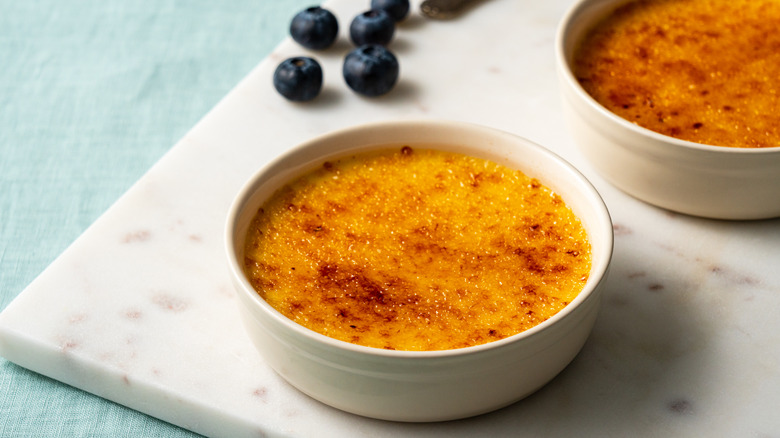Despite Its Name, Crème Brûlée's True Origin Remains A Mystery
Crème brûlée is one of those desserts that makes you feel fancy when you eat it. Maybe this is because of the torch that is used, the special ramekin that it is served in, or maybe it's just because its name sounds elegant. However, crème brûlée is kind of a dessert of contradictions. While it seems fancy, there are just a few simple ingredients in its recipe: Cream, vanilla, eggs yolks, and sugar, per Taste Atlas. It's also a creamy custard, yet it has that signature burnt sugar, crunchy top, thanks to the use of the aforementioned torch. Per The New York Times, you don't necessarily need a torch if you want to make a variation of the dessert, like Bay Leaf Crème Brûlée, at home. You can just use the broiler in your oven to get that hard, caramelized top.
Another interesting note is the dessert's name. According to Saveur, crème brûlée means "burnt cream" in French. This is in reference to its caramelized top. So one may assume that the custard dessert must have originated in France. However, this may not be the case; thus shrouding the dessert's origins in mystery.
French in name only?
Taste Atlas states that France, England, and Spain all lay claim to crème brûlée. In England, it was called burnt cream and in Spain it was known as crema Catalana. Custards are nothing new to the culinary scene. They've actually been popular since the Middle Ages.
Saveur explains that there are similar recipes from England that date back to the 15th century. In those recipes, the burnt cream has sugar that was caramelized with a "hot iron." As for the French, crème brûlée first appears in a 1691 cookbook and it's pretty close to today's version. The Spanish version of custard with burnt sugar can be traced back to the medieval era (per Saveur). The United States has its own history with the dessert. Founding Father and America's third president Thomas Jefferson is credited with bringing French dishes to the United States, including crème brûlée (per Newsweek). So while the origin of crème brûlée is still up for debate, its delicious taste is not.

